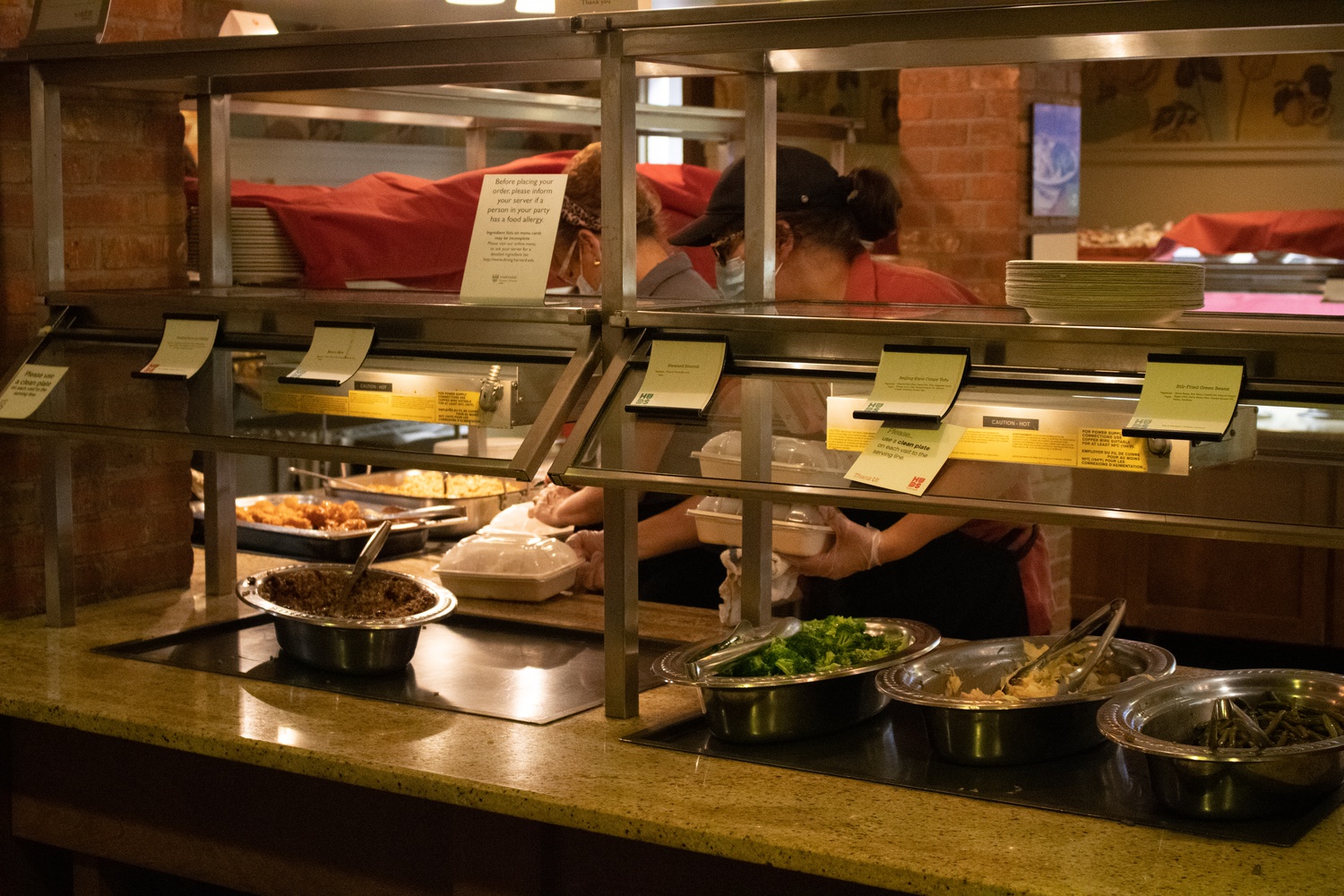
News
Harvard Grad Union Agrees To Bargain Without Ground Rules

News
Harvard Chabad Petitions to Change City Zoning Laws

News
Kestenbaum Files Opposition to Harvard’s Request for Documents

News
Harvard Agrees to a 1-Year $6 Million PILOT Agreement With the City of Cambridge

News
HUA Election Will Feature No Referenda or Survey Questions
HUDS’s New Contract and the Strike that Paved the Way
There’s something for us to cheers to in Harvard’s dining halls. After months of deliberation, Harvard and UNITE HERE Local 26, the labor union for employees of Harvard University Dining Services, ratified a five-year contract guaranteeing wage increases, greater job security, and the preservation of the current health care coverage granted to union members. 99.45 percent — virtually all voting union members — voted to approve it.
This agreement comes after years of small battles and broad strokes of action which, together, helped make this larger victory possible — including a campus-wide strike in 2016 that paralyzed food service in the dining halls and inspired new labor movements across other Boston area campuses.
We are thrilled by the ratification of this new contract, which could not have happened without the unflagging efforts of UNITE HERE Local 26. We are especially pleased that Harvard has offered jobs to contracted workers who were laid off in last year’s Covid-19-related budget cuts, workers we implored Harvard to protect, even at the expense of its bottom line.
While we frequently applaud the work of our undergraduate activists — as we did earlier this month following the Harvard Management Corporation’s divestment from fossil fuels — the successes of workers on campus are just as worthy of recognition. UNITE HERE Local 26 follows a coalition-based philosophy of labor organization, representing workers across sectors of the hospitality industry such as hotel, gaming, food service, laundry, and textile throughout Massachusetts and Rhode Island. This comprehensive model has proven powerful, and makes sense: The struggles of workers anywhere are likely to mirror the struggles of workers everywhere. Campuses forming new unions, as MIT did late last month, should look to UNITE’s model for inspiration.
This agreement also takes place amidst a flashbulb moment for labor on campus. 4 labor unions are currently negotiating new contracts with the university. Harvard Graduate Students Union-United Automobile Workers’ has just overwhelmingly authorized a strike, as the union did prior to actually striking in fall 2019. Just as we supported HGSU-UAW’s strike then and HUDS’s strike in 2016, we support HGSU-UAW using the leverage it can to fight for improved worker protections.
UNITE HERE Local 26’s and the University’s negotiation of a contract that works for workers exemplifies the key role unions play (and have for two centuries) in securing a fairer America. Data from the Bureau of Labor Statistics show that unionized workers are better compensated and have more employee benefits than their non-unionized counterparts. Unfortunately, American unions have been on the decline for decades.
Many of the benefits and protections outlined in this new contract, which will shape Harvard workers’ lives for at least the next five years, were won after the 2016 HUDS strike. The 22-day affair blew up campus. The dining hall system, which many administrators peg as the heart of campus life, collapsed as only 14 of 750 workers passed the picket line (houses passed out frozen food). But it also prevented a new insurance plan which would have priced many workers out of their healthcare from taking hold — a seemingly enduring victory.
As we celebrate the successes of this union negotiation process, and eye a potential HGSU-UAW strike on the horizon, we should remind ourselves of the power unions (and yes, strikes) have to improve people’s lives.
This staff editorial solely represents the majority view of The Crimson Editorial Board. It is the product of discussions at regular Editorial Board meetings. In order to ensure the impartiality of our journalism, Crimson editors who choose to opine and vote at these meetings are not involved in the reporting of articles on similar topics.
Have a suggestion, question, or concern for The Crimson Editorial Board? Click here.
Want to keep up with breaking news? Subscribe to our email newsletter.
Most Read
- Harvard’s Hyperfixation on Israel Is Academically Unserious
- Harvard Police Union Overwhelmingly Votes No Confidence in HUPD Chief Clay
- Trump Administration Conditions Harvard’s Funding on Eliminating DEI, Restricting Protests
- Facing Trump’s Ultimatum, Harvard Has No Easy Choices
- House Door Boxes Elicit Backlash Over Conservative Student Publication
From Our Advertisers

Over 300+ courses at prestigious colleges and universities in the US and UK are at your disposal.

With innovative financial tools combined with financial education, Collegiate empowers students to take control of their finances and build confidence in their money management skills.

Serve as a proctor for Harvard Summer School (HSS) students, either in the Secondary School Program (SSP), General Program (GP), or Pre-College Program.

With an increasingly competitive Law School admissions process, it's important to understand what makes an applicant stand out.

Welcome to your one-stop gifting destination for men and women—it's like your neighborhood holiday shop, but way cooler.

HUSL seeks to create and empower a community of students who are seeking pathways into the Sports Business Industry.

